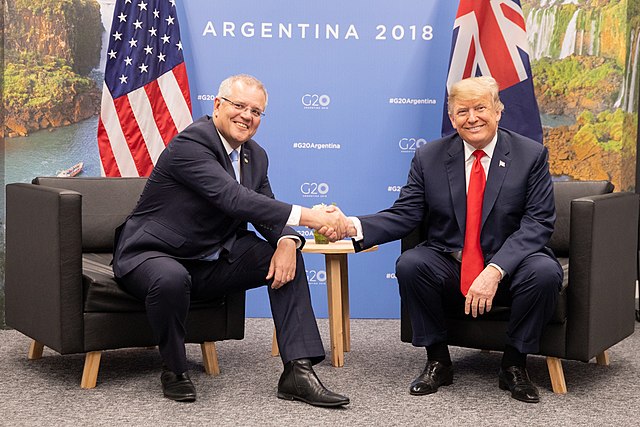Jason Scott and James Thornhill, Bloomberg
Prime Minister Scott Morrison’s surprise victory in Australia’s election was a win for the coal industry and ensures the debate about tackling climate change will continue to polarize the nation.
Rather than backing the opposition Labor party’s plans for sweeping cuts to greenhouse gas emissions, voters fell in behind a conservative government that has refused to legislate its Paris Agreement commitments. Morrison once brandished a lump of coal in parliament as a mark of his support for the industry, and in focusing his energy policy on lowering electricity prices has derided the reliability of wind and solar.
“The battle to combat climate change in Australia has suffered a major setback,” said Frank Jotzo, an academic in climate economics and policy at the Australian National University. “Australia could hugely benefit from the worldwide shift from fossil fuels to renewables. My colleagues around the world are shaking their heads in disbelief about the political system’s inability to translate those advantages into reality.”
Coal miners gained strongly in Sydney trading Monday, with New Hope Corp. rising as much as 4.8% and Yancoal Australia Ltd. and Whitehaven Coal Ltd. jumping as much as 6.1% and 2.7% respectively.
Since coming to power in 2013, the Liberal-National coalition has largely rejected market-driven measures to tackle climate change. It scrapped the carbon price mechanism introduced by the previous Labor government and refused to legislate any measures to penalize greenhouse-gas polluters. As treasurer in 2017, Morrison taunted rival Labor lawmakers in parliament with a lump of coal, saying they were “scared” of the industry and its implications for their policy platform of reducing emissions.
The jibe proved prescient.
Adani Power Ltd.’s plan to develop a coal mine in Queensland state was hugely divisive during the election campaign and ultimately helped derail Labor leader Bill Shorten’s bid for office. He equivocated on his support for the mine, unable to balance the need to create blue-collar jobs with his environmental pledges. In contrast, Morrison’s support for the project resonated with voters and the coalition picked up crucial seats in the state.
The Adani project, first proposed in 2010 and still lacking final environmental approvals from the Queensland state government, would open up a new coal-mining region that could see Australian coal exports double. The fuel generates the bulk of Australia’s power and contributes A$60 billion ($41 billion) a year in export income.
Despite Australia having huge coal resources, the renewables industry has still found a niche. Industries such as wind, solar and hydro accounted for about 19% of Australia’s power generation in 2018, up from less than 10% a decade ago.
Still, there’s concern the transition to renewables may slow or stall under Morrison. The industry had been preparing for a Labor government, which was targeting a 45% cut in emissions from 2005 levels by 2030 and pledged an additional A$10 billion over five years to support large-scale renewable generation and storage projects.
“That’s not now going to happen,” said Stephen Panizza, head of renewable energy at Federation Asset Management in Sydney. “Do we get to the same place anyway? Yes, we do, perhaps just over a longer period of time.”
While the coalition does support some renewable energy projects, such as a massive upgrade to the nation’s largest hydro-electric project, it’s also weighing up whether to use taxpayer dollars to subsidize a new coal-fired plant and to keep aging ones operating.
That’s despite a Lowy Institute poll released in July showing 59 percent of Australians believe global warming is a serious problem that needs to be combated even if it involves significant costs.
Morrison has said Australia will meet its Paris Agreement target to reduce CO2 emissions by at least 26% from 2005 levels by 2030 “at a canter,” but has not enshrined the target in legislation. He’s pledged A$2 billion for a new Climate Solutions Fund and promised to plant 1 billion trees by 2050.
The response to Morrison’s victory is mixed. The Australian Conservation Foundation condemned the lack of “substantive climate-change policies” proposed by the government and called for the Adani mine to be blocked.
Mining industry lobbyists welcomed Morrison’s win, saying it will boost regional jobs. “There is now a clear mandate for resources projects that have lawful approvals to proceed,” including the Adani mine, the Minerals Council of Australia said.
Still, businesses operating in Australia need policy certainty on issues including energy and climate change, BHP Group Chief Financial Officer Peter Beaven said Monday on the sidelines of a Melbourne conference.
A deep ideological divide over climate policy has fractured the Liberal party over the years and contributed to former prime minister Malcolm Turnbull being ousted by his own lawmakers in August. While Morrison’s victory gives him a newfound authority to set policy direction, it remains unclear whether he will steer a more moderate line and do more to support renewables.
Labor lawmakers vying for the party’s leadership after Shorten announced he would step down are indicating climate change will remain at the heart of future battles to win office.
–With assistance from David Stringer and Matthew Burgess.





